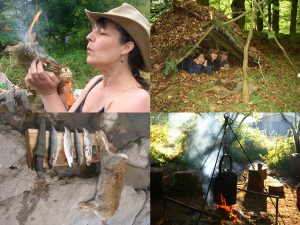Here’s a living example of a ‘lean’ economy (outlined by David Fleming in our last blog post), and how you can help to preserve it. The ‘unlean’ economy is encroaching onto the territory of the Kichwa and Sapara communities in the Ecuadorean Amazon, in the form of large oil corporations, and will destroy their communities, as well as the forest itself, unless prevented. Put bluntly like that, it sounds as if these people are being threatened by an alien species – but no, these are ordinary humans working within the corporate system to destroy the most precious things they (and ultimately, we) have – ecology, community, life – in the never-ending search for more profit.
Our friend Joe is a film-maker (and a hydroponics specialist). He explained to me that a lot of the ‘lean thinking’ practices outlined by David Fleming are already alive and well in Amazonian indigenous communities. He hopes that their latest film (see below) ‘will be able to bring some of that indigenous knowledge and wisdom to audiences here in a way that can be acted upon both practically and philosophically’. Certainly, in the age of the internet, indigenous culture can influence Western culture in a way that wasn’t possible for earlier generations, with their intrinsic belief in the superiority of industrial society over cultures that more closely link people to nature and to each other. Nowadays, more and more people are understanding the damage that our corporate-dominated economy is causing to nature and to ourselves, and so are more open to learning about ways of life that would previously been considered inferior.
What they know, we’re going to have to re-learn if we’re going to harmonise with nature and therefore survive.
Over to Joe:
————————————————————————-
We are launching a campaign and a documentary at a crucial time for the indigenous communities of the Ecuadorian Amazon, many of which are facing considerable challenges in maintaining their cultures, environment and way of life. Your support will be vital in taking the documentary through editing & post-production, getting it screened as widely as possible and making the maximum possible impact. The crowdfunding campaign aims to raise $10,000 in order to take the documentary through editing and post-production, and to distribute it as widely as possible.
The film, titled ‘Reimagining Progress- Voices from the Ecuadorian Amazon’, will be a feature-length documentary. The documentary footage was filmed alongside the Sapara and Kichwa communities of the Ecuadorian Amazon. The film aims to deliver their urgent and thought-provoking messages to the international community.
‘Reimagining Progress- Voices from the Ecuadorian Amazon’ Film Trailer (‘cc’ button for English subs) from Reimagining Progress Film on Vimeo.
We recommend watching the trailer in full HD for best quality for which you need to click on the HD sign on the bottom right hand side of the video and select ´1080p´. Select ´CC´ button for English subtitles.
————————————————————————————————————-
These neighbouring communities are united in their common struggle to protect their natural environment. They face pressure from the imminent entry of oil companies onto their territory following the auctioning off of blocks 79 and 83 to Andes Petroleum in January of this year. As seen in other parts of the Amazon, the entry of oil companies would have a significant impact on the natural environment on which these communities rely.
They are also confronting the forces of globalization which threaten to erode their culture and way of life, which in the case of Sapara has left the nation facing huge uncertainties as to whether their culture and language will survive.

Through a series of in-depth interviews with a range of community members, including spiritual and political leaders, the documentary will capture a detailed representation of the current situation faced by these communities.
It will feature their inspirational resistance, wide-ranging philosophy and the central role indigenous women are playing at the forefront of the struggle. Interview footage will be interwoven with a range of general community activity footage and scenes from daily life in these jungle communities to give a detailed insight into their lives.
The film will explore the importance of medicinal knowledge and ceremonial practices as well as their unique worldview based on a profound, spiritual connection with nature. It will also include the innovative environmental proposals that have been developed and presented by community members in international forums such as COP21 in Paris aiming to protect the Amazon forest not simply for themselves but for the whole of the planet.

Through an examination of these themes the film will seek to inform audiences of their vision for the future. It intends for the international community to learn both practically and philosophically from the Sapara and Kichwa communities in their attempt to confront global environmental degradation and the threat of climate change, whilst also building awareness to support them in their current struggle to protect their territorial integrity and culture.
The documentary team spent a number of weeks filming in the jungle communities of the Sapara and Kichwa of Sarayaku, fully immersing themselves in community life. They then headed northeast to the border town of Nueva Loja and surrounding areas where they explored the environmental and social implications of oil extraction.
Nueva Loja and its deforested surroundings will provide the contrast point to the preserved forest and the sustainable ways of life documented in the jungle communities, whilst also illustrating the stark dangers of pursuing oil extraction as the team were confronted with accounts of environmental contamination which has led to grave and widespread health problems.

Meeting with a committee of local people affected by contamination and interviewing the President of the ‘Frente de Defensa de la Amazonia’, the team heard testimonials that affirmed the importance of the community resistance documented in the forest and a shared desire to keep the preserved rainforest intact and free from extractive industries.
Details regarding the development of the project, distribution strategy, cost breakdown and the film trailer are available on the Indiegogo page-
https://www.indiegogo.com/projects/reimagining-progress-documentary-film–2/x/14356412#/
The team can be contacted at [email protected]











